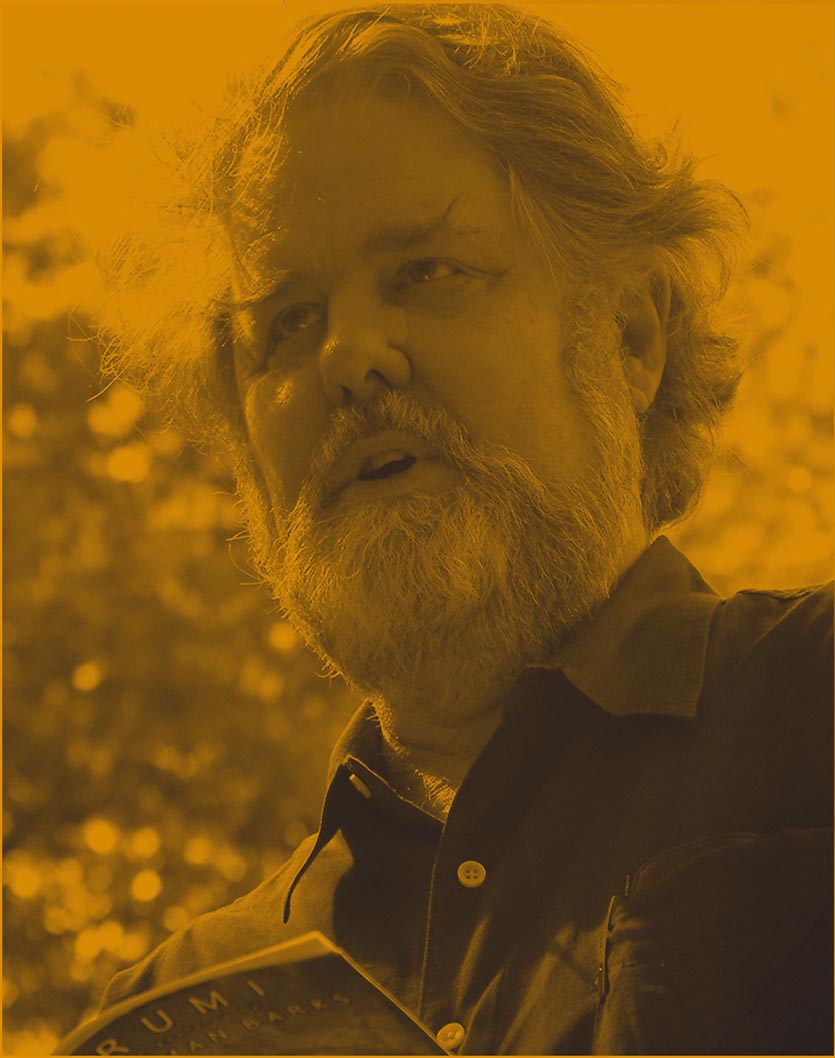Coleman Barks

The Essential Rumi
The Soul of Rumi
The Book of Love
Unseen Rain
The Illuminated Rumi
The Hand of Poetry
Poems of Rumi
The Illuminated Prayer
Barks is a private person who avoids admirers and the curious. “One appointment ruins the day,” he explains in his gentle Tennessee accent. “I love having nothing to do.” His initial wariness gives way to animation as he takes me on a tour of the place, which has the feel of a bachelor’s lair, with its big bed and large-screen television in the windowless downstairs.
This is the house that Rumi built. Born eight centuries ago this year, the Persian mystic is now one of the best-selling poets in the United States. That astonishing fame is due in large part to Barks, who has spent much of the past thirty years rendering thousands of Rumi’s poems into an English that captures the deep humanity and sublime divinity of the poet’s verse.
A poet in his own right who has published six books of poetry, Barks taught literature at the University of Georgia for thirty years before retiring. His journey with Rumi began in 1976, when friend and fellow poet Robert Bly gave him a copy of a stilted academic translation of Rumi’s poetry. “These poems need to be released from their cages,” Bly said. Barks had never heard of Rumi, and he did not speak or write Farsi (nor does he now), but he accepted the challenge, using existing translations and his own poetic talents. That work led him to Philadelphia, where he became a student of Sri Lankan spiritual teacher Bawa Muhaiyaddeen, who provided Barks with a living example of Sufism, the mystical Islamic tradition of which Rumi was an adherent. All Muslims believe they will be reunited with God after death, but Sufis use esoteric practices to encounter the ineffable in this life. Barks’s Rumi project eventually grew into a series of books — now numbering nineteen — that shocked publishers by catapulting a thirteenth-century Persian poet onto the bestseller lists. It’s no small irony that a Persian Muslim is one of America’s most popular poets at a time when relations between the U.S. and Iran — and the Islamic world as a whole — are so strained.
Jelaluddin Rumi was born September 30, 1207, in the ancient trading city of Balkh in what is now Afghanistan, during a time of war, social upheaval, and spiritual questioning. In the West, Thomas Aquinas, Meister Eckhart, and Saint Francis of Assisi were remaking Christianity; in the Holy Land, Europeans were fighting Muslims; and in the East, the medieval world of Islam was at the height of its intellectual and artistic vigor. When Rumi was five, his father took his family west to avoid Mongol invasions, passing through the great city of Baghdad before settling at Konya in what is now Turkey. When Rumi was thirty-nine, he met the mysterious Shams, an older mendicant who was to have a profound influence on Rumi’s life and work. Legend has it that Rumi and Shams first met beside a fountain in Konya. Rumi was talking to his students with his father’s spiritual notebook, the Maarif, open beside him. Shams apparently interrupted the conversation by pushing the precious text into the water. When Rumi demanded to know why Shams had done this, Shams reportedly replied, “It is time for you to live what you have been reading of and talking about.”
This was the start of a passionate friendship between the two men. At one point Shams disappeared — or, some say, was killed by Rumi’s jealous followers.The brokenhearted Rumi ultimately composed forty-five thousand verses in honor of his lost friend. He also produced works of theology and philosophy, including the massive six-volume Masnavi, which is called the “Persian Koran” for its lyricism and wisdom. Rumi died in his bed in Konya on December 17, 1273.
Barks’s interpretations of Rumi sometimes irritate both liberal academics and conservative Islamic theologians, who say he has catered to a New Age market by downplaying the religious and patriarchal aspects of the poet’s huge corpus in favor of the universal and the sensual. Most scholars, however, give Barks credit for breathing life into poems that are notoriously difficult to translate into readable English, and for making Rumi virtually a household name in the West.
Barks has a grizzled beard and wavy eyebrows, and he drives a pickup truck. There’s little of the media star about him, despite the fact that his books of Rumi’spoetry have sold more than three quarters of a million copies, earning him the attention of everyone from Iranian imams to journalist Bill Moyers. Rumi’s poetry, Barks writes, “is God’s funny family talking on a big, open radio line. BY ANDREW LAWLER • OCTOBER 2007
https://www.thesunmagazine.org/issues/382/walking-around-in-the-heart
